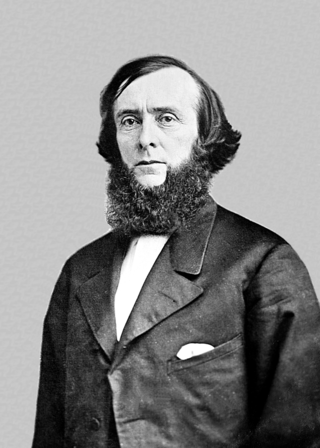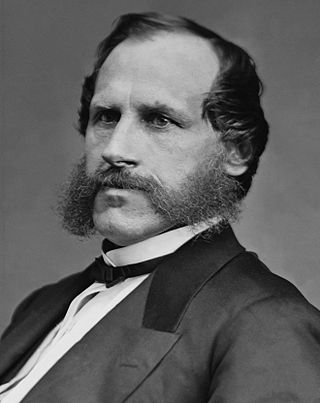
Events from the year 1875 in Canada.

Edwards Pierrepont was an American attorney, reformer, jurist, traveler, New York U.S. Attorney, U.S. Attorney General, U.S. Minister to England, and orator. Having graduated from Yale in 1837, Pierrepont studied law and was admitted to the bar in 1840. During the American Civil War, Pierrepont was a Democrat, although he supported President Abraham Lincoln. Pierrepont initially supported President Andrew Johnson's conservative Reconstruction efforts having opposed the Radical Republicans. In both 1868 and 1872, Pierrepont supported Ulysses S. Grant for president. For his support, President Grant appointed Pierrepont United States Attorney in 1869. In 1871, Pierrepont gained the reputation as a solid reformer, having joined New York's Committee of Seventy that shut down Boss Tweed's corrupt Tammany Hall. In 1872, Pierrepont modified his views on Reconstruction and stated that African American freedman's rights needed to be protected.

Francis Preston Blair Jr. was a United States Senator, a United States Congressman and a Union Major General during the Civil War. He represented Missouri in both the House of Representatives and the Senate, and was active in preventing the State of Missouri from being absorbed into the Confederacy at the beginning of the Civil War.

George Henry Williams was an American judge and politician. He served as chief justice of the Oregon Supreme Court, was the 32nd Attorney General of the United States, and was elected Oregon's U.S. senator, and served one term. Williams, as U.S. senator, authored and supported legislation that allowed the U.S. military to be deployed in Reconstruction of the southern states to allow for an orderly process of re-admittance into the United States. Williams was the first presidential Cabinet member to be appointed from the Pacific Coast. As attorney general under President Ulysses S. Grant, Williams continued the prosecutions that shut down the Ku Klux Klan. He had to contend with controversial election disputes in Reconstructed southern states. President Grant and Williams legally recognized P. B. S. Pinchback as the first African American state governor. Williams ruled that the Virginius, a gun-running ship delivering men and munitions to Cuban revolutionaries, which was captured by Spain during the Virginius Affair, did not have the right to bear the U.S. flag. However, he also argued that Spain did not have the right to execute American crew members. Nominated for Supreme Court Chief Justice by President Grant, Williams failed to be confirmed by the U.S. Senate primarily due to Williams's opposition to U.S. Attorney A. C. Gibbs, his former law partner, who refused to stop investigating Republican fraud in the special congressional election that resulted in a victory for Democrat James Nesmith.

John Potter Stockton was a New Jersey politician who served in the United States Senate as a Democrat. He was New Jersey Attorney General for twenty years, and served as United States Minister to the Papal States from 1858 to 1861.

New York's 20th congressional district is a congressional district for the United States House of Representatives in New York's Capital District. It includes all of Albany, Saratoga, and Schenectady counties, and portions of Rensselaer county.

The 1878 United States House of Representatives elections in South Carolina were held on November 5, 1878 to select five Representatives for two-year terms from the state of South Carolina. Two Democratic incumbents were re-elected, two Republican incumbents were defeated and the open seat was picked up by the Democrats. The composition of the state delegation after the election was solely Democratic.

The Wheeler Compromise, sometimes known as the Wheeler Adjustment, was the settlement of the disputed gubernatorial election of 1872 in the U.S. state of Louisiana, and negotiation to organize the state's legislature in January 1875. It was negotiated by, and named after, William A. Wheeler, Congressman from New York and a member of the U.S. House Committee on Southern Affairs. He later was elected as Vice President of the United States.

The 1875 New York state election was held on November 2, 1875, to elect the Secretary of State, the State Comptroller, the Attorney General, the State Treasurer, the State Engineer, a Canal Commissioner and an Inspector of State Prisons, as well as all members of the New York State Assembly and the New York State Senate.
Geraldine was a former parliamentary electorate in the South Canterbury region of New Zealand that existed three times from 1875 to 1911. It was represented by six Members of Parliament.

The 1883 New York state election was held on November 6, 1883, to elect the Secretary of State, the State Comptroller, the Attorney General, the State Treasurer and the State Engineer, as well as all members of the New York State Assembly and the New York State Senate. Besides, a constitutional amendment to abolish contract labor from the state prisons was proposed and accepted with 498,402 votes for and 269,377 against.

The 1887 New York state election was held on November 8, 1887, to elect the Secretary of State, the State Comptroller, the Attorney General, the State Treasurer and the State Engineer, as well as all members of the New York State Assembly and the New York State Senate.

The 1875 United States Senate election in New York was held on January 19 and 20, 1875, by the New York State Legislature. The legislature, with a Republican Senate and Democratic Assembly, jointly elected Democrat Francis Kernan Senator. Kernan became the first Democrat to represent New York since 1851.
Members of the New South Wales Legislative Assembly who served in the eighth parliament of New South Wales held their seats from 1874 to 1877. The 1874–75 election was held between 8 December 1874 and 12 January 1875 with parliament first meeting on 27 January 1875. There were 72 members elected for 52 single member electorates, 6 two member electorates and 2 four member electorates. During this parliament the number of graduates of Sydney University exceeded 100 and the seat of University of Sydney was created. The maximum term of this parliament was 3 years and the assembly was dissolved after 34 months. Premiers during this parliament were Sir John Robertson 9 February 1875 till 22 March 1877 and from 17 August 1877 and Sir Henry Parkes 22 March 1877 till 17 August 1877. The Speaker was William Arnold until his death on 1 March 1875 and then George Allen.

The 1874–75 United States Senate elections were held on various dates in various states. As these U.S. Senate elections were prior to the ratification of the Seventeenth Amendment in 1913, senators were chosen by state legislatures. Senators were elected over a wide range of time throughout 1874 and 1875, and a seat may have been filled months late or remained vacant due to legislative deadlock. In these elections, terms were up for the senators in Class 1.
War Democrats in American politics of the 1860s were members of the Democratic Party who supported the Union and rejected the policies of the Copperheads. The War Democrats demanded a more aggressive policy toward the Confederacy and supported the policies of Republican President Abraham Lincoln when the American Civil War broke out a few months after his victory in the 1860 presidential election.

The 1786 Vermont Republic gubernatorial election took place throughout September, and resulted in the re-election of Thomas Chittenden to a one-year term.